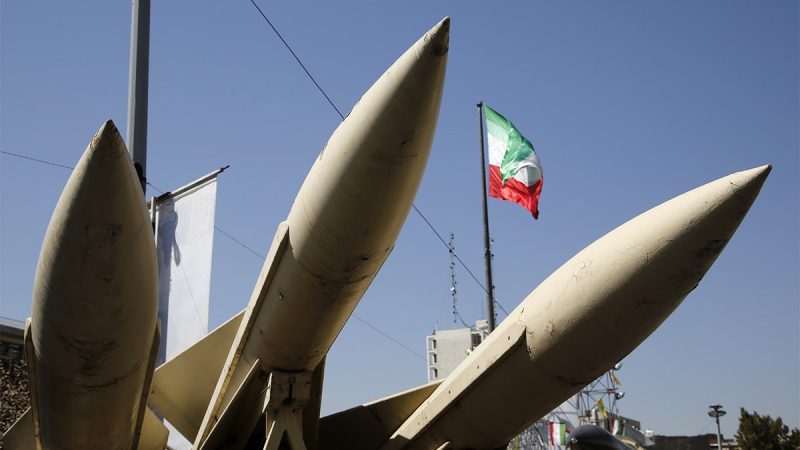A new report shared with the Trump transition team and shown to Fox News Digital recommends drastic steps to curtail the Iranian regime just days away from the start of President-elect Donald Trump’s second term in office.
‘President-elect Trump now has the unique opportunity to push back on the regime in a moment of its significant decline. By using diplomatic, informational, military, and economic means to hold Tehran accountable, he can promote regional stability and a new Middle East,’ Ambassador Mark D. Wallace, CEO and founder of United Against Nuclear Iran (UANI), told Fox News Digital.
The UANI report, titled ‘A 100 Day Plan for the Incoming Trump Administration on Iran’ is a blueprint for the administration to employ against Iran and has been shared with the Trump transition team, according to its authors.
‘Since 1979, Iran has been the world’s number one state sponsor of terrorism, the major cause of instability in the Middle East, and has brutally repressed its people with impunity,’ Wallace said.
The report recommends that the incoming Trump administration take a comprehensive, whole-of-government approach across, as Ambassador Wallace said, the diplomatic, informational, military and economic sectors alongside allies to properly hold Iran accountable for its regional destabilization efforts.
Iran fears the incoming Trump administration, said co-author of the report Jason Brodsky, adding he believes there is a strategic opportunity for Washington and its allies to capitalize on that fear to advance U.S. interests.
‘Rushing into premature diplomacy risks undermining that dynamic,’ Brodsky, policy director of UANI, told Fox News Digital.
The report outlines several specific policy prescriptions in order to weaken Iran and argues that the U.S. government should first build a pressure campaign against Iran which will sharpen the regime’s choices.
In this new policy approach, the United States should learn from Israel’s experience since Oct. 7 about how to strike the Islamic Republic militarily without triggering a wider war.
‘If the Israelis can do so without triggering a wider war, so can the U.S. government,’ Brodsky said.
The authors assert that President-elect Trump should deliver a major policy address to warn Tehran that the U.S. would not hesitate to use military force to destroy Iran’s nuclear program if it takes steps to further advance its capabilities. The International Atomic Energy Agency reported in early December enriched uranium to weapons-grade levels. French President Emmanuel Macron said Iran’s nuclear program is nearing the ‘point of no return’ with many seeing it as a method to build leverage against the incoming Trump administration.
Additionally, the report’s authors say the incoming Republican administration could also use targeted strikes against Islamic Revolutionary Guard Corps commanders, Quds Force and Intelligence Ministry assets inside Iran if Iran or its proxies harm Americans. Targeted strikes should also hit Iran’s repressive apparatus through cyber and kinetic means if security forces violently suppress innocent protesters, as happened in 2009 after the disputed presidential election and in 2022 following the death of Mahsa Amini, who had been arrested by the morality police for not covering her hair with a hijab.
U.S. strikes or retaliations against the regime, the report notes, have been non-existent or focused on the Islamic Republic’s proxies.
‘That dynamic only emboldens Iranian decision-making to calculate the benefits of these operations against Americans outweigh the costs and to doubt the U.S. resolve to defend its interests. The incoming Trump administration should reverse that calculus and one way to do so is to start holding Iran’s regime responsible on Iranian soil for the terrorism of its proxies,’ Brodsky explained. The U.S. should also build a military defector program and encourage political and military actors across the Islamic Republic, including within the Revolutionary Guard and other security forces, to defect from the regime.
A key source of Iranian revenue is provided by its vast oil exports and allows Iran to sustain its terror across the Middle East through its ‘Axis of Resistance’ proxy networks. In 2024, Iran exported 587 million barrels of oil, an increase of 10.75% compared to the previous year due to OPEC cuts and lack of sanctions enforcement.
Claire Jungman, co-author and director of the Tanker Tracking Program and chief of staff of UANI, told Fox News Digital that Iran’s oil exports have surged to nearly 2 million barrels per day—the highest in five years—under President Biden’s administration, reflecting weakened sanctions enforcement and the impact of billions in unfrozen assets.
‘The incoming Trump administration has a critical opportunity to halt Tehran’s illicit revenue streams and restore maximum pressure on the regime,’ Jungman added.
Iran is the world’s leading state sponsor of terrorism and is a key source of regional Islamist terror groups including Hezbollah and Hamas, the group responsible for the Oct. 7 attacks against Israel. The State Department estimates that Iran provides some $100 million annually to Hamas and helps fund Hezbollah with about $700 million a year.
UANI cautions against some in Western capitals who wish to seek negotiation with Tehran and views this flawed approach of endless negotiations as a way Iran can buy time and avert pressure. Ambassador Wallace said the previous maximum pressure campaign worked, and it’s time to reapply this policy as the regime faces setback after setback as it became embroiled in regional conflict with Israel after October 7th.
‘With the loss of its proxies and the support of the Iranian people … the Iranian regime’s days are numbered and, inevitably, the brave Iranian people will rise against the weakened corrupt mullahs,’ Wallace said.
Related Topics
Iran
Middle East
Israel
Trump Transition
Terrorism
Worldwide Conflicts
This post appeared first on FOX NEWS
